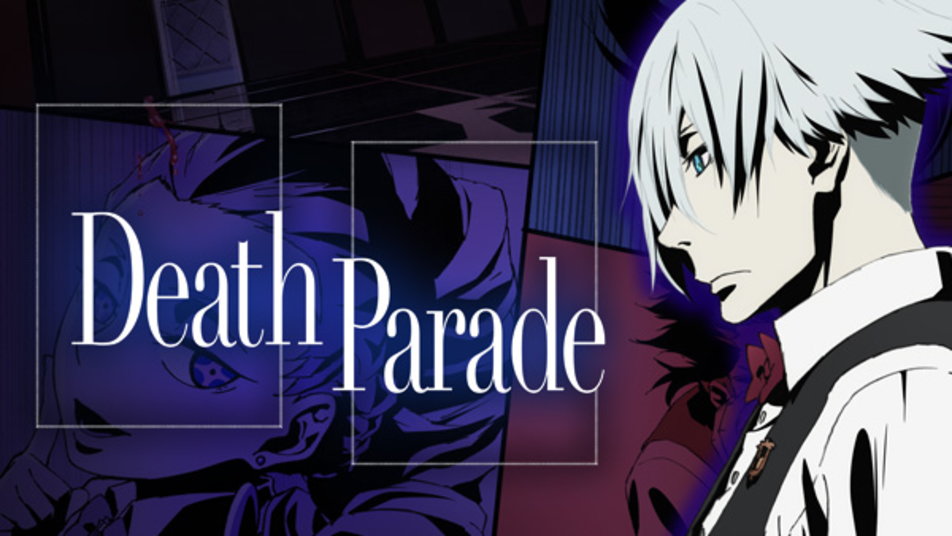
Review: Death Parade
By Shayne Paladin
Today, we’ll be taking a look at a show that I can only describe as being a “pattern disrupt”.
By that, I mean that it’s an experience quite unlike what you’ve encountered before in Anime–for all the right reasons.
Why, you ask? Well, we’re about to find out.
Without further ado, I gleefully present to you all my much-anticipated review of the existential exploration known as Death Parade.
Let’s do it:
Plot/Story
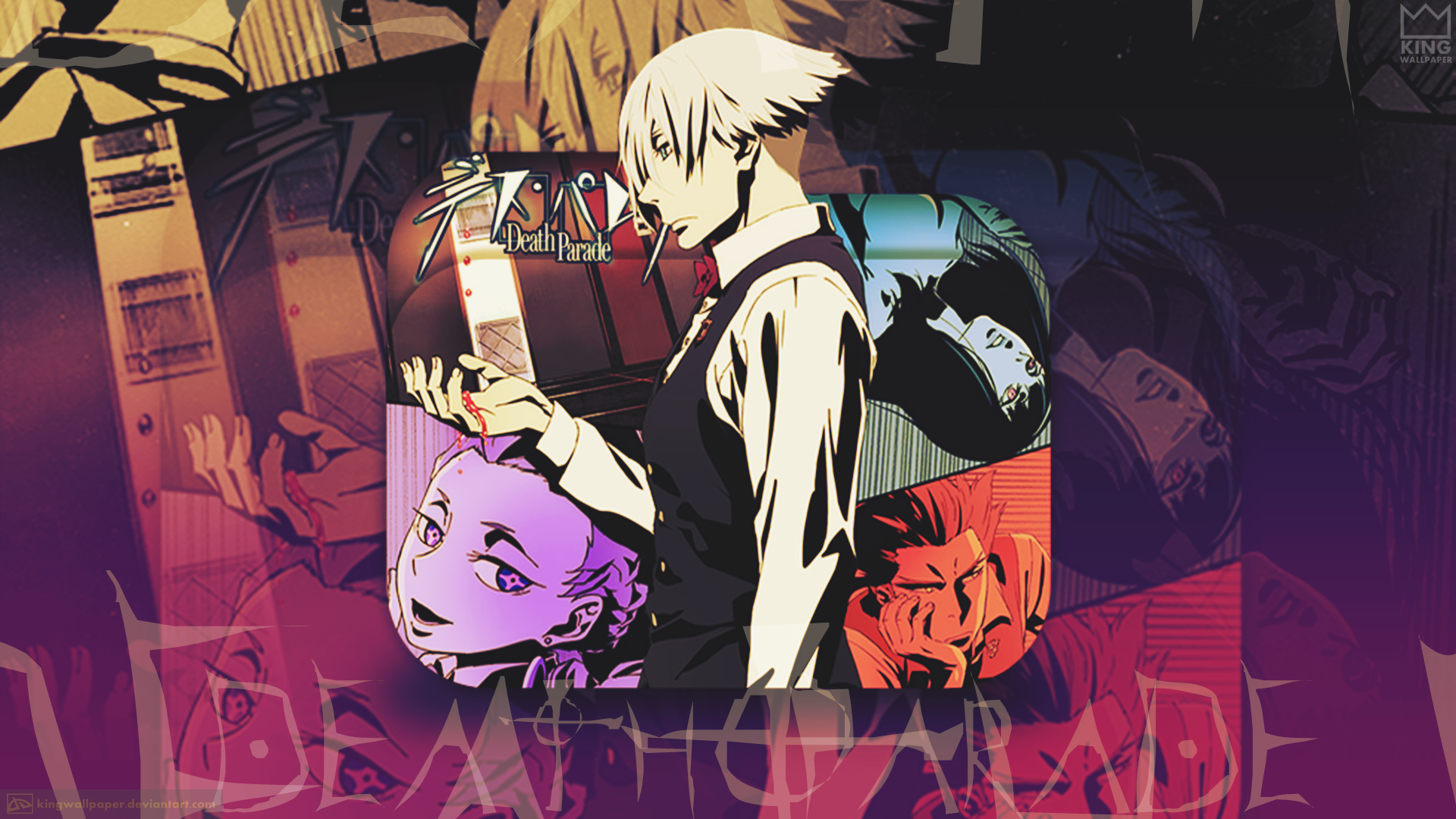
Death Parade takes place in what us humans would recognize as Purgatory–the intermediate state between the living world and the afterlife.
The show’s manifestation of Purgatory is a series of mysterious bars, which are inhabited by a single bartender. These bartenders are known as “Arbiters”, and their primary task is to judge the souls of the recently deceased who arrive at the bar.
The attendees of the bars, typically arriving in pairs, have little memory of how they arrived there–often unaware that they’ve died in the first place.
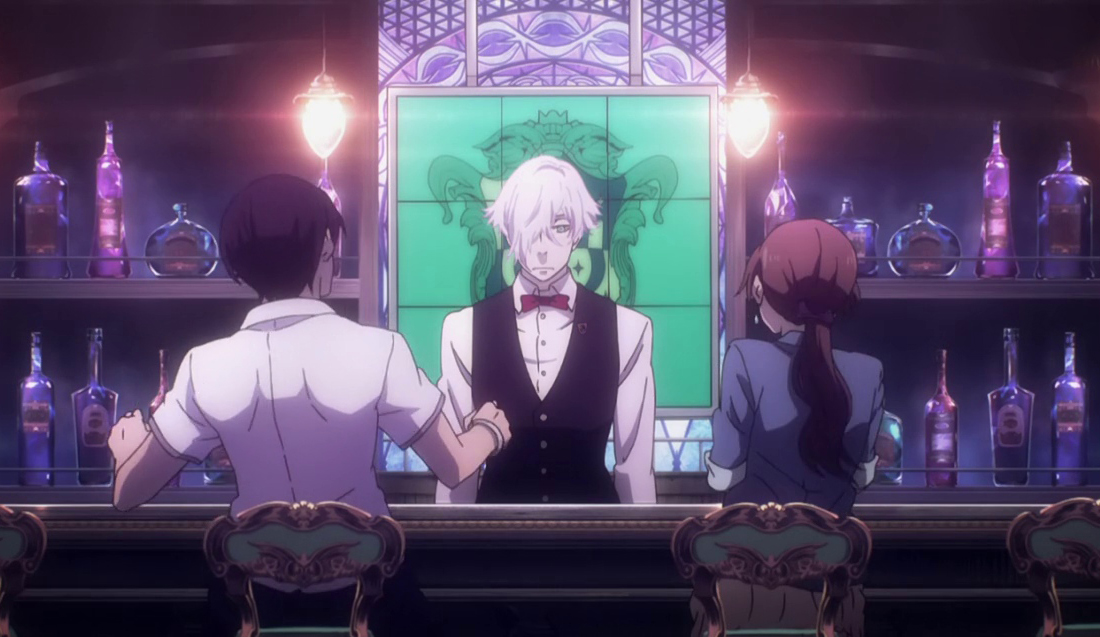
Soon after, the two contestants are tasked with playing a game against one another to decide the fate of their souls. The winner will be sent up for reincarnation, granted a second lease on life, while the loser has his or her soul sent to “The Void”
This all takes place under the watchful eye of the Arbiter, who is primarily observing the character of the contestants, rather than whoever is actually winning.
Arbiters also have the ability to secretly interfere with the game, with the intention of dragging it on and giving both players more time to reveal their true selves. This is especially useful to Arbiters since they have full access to the memories of each person, while the contestants themselves slowly gain their memories back as the game progresses.

Beyond that, there isn’t much more “world-building” that Death Parade does. I’ve heard opinions both for and against this lack of a thorough backstory, and I lean more towards the side that doesn’t mind it. I didn’t really wonder too much about how the tower came to be, or why it exists, because I was too interested in the first episode’s events.
The plot mainly focuses on Decim, the designated Arbiter of the 15th floor known as Quindecim, and the players he encounters.
The show follows an episodic format, with each episode (or two) focusing on a new set of contestants. This means of progression perfectly fits a series like Death Parade, since it allows it to feature a variety of stories and characters in only 12 episodes. Half the fun is looking back after the concluding episode and picking which set of contestants you liked best.
Due to the nature and purpose of these Death Games, we get a rather deep view into the lives and eventual deaths of each contestant featured in the plot. As their memories come back to them, they are given a chance to reevaluate their lives with 20/20 hindsight. And given the stakes of the game, we get to see several characters revert to their most animalistic selves for the sake of winning and getting a second chance.

The tempo the show constantly presents these types of scenarios makes for a series that is relentlessly hard-hitting. We all like to wonder what others will think of us once we’re gone, but Death Parade presents the question of what we would think of ourselves if given the chance.
Of course, there still is a main story to help centralize all these episodes. The character only known as “The Black-Haired Woman”, is a person who arrived at Quindecim with absolutely no memories. As such, she cannot be properly judged, and thus takes the role as Decim’s assistant.
However, I constantly would forget about her growing desire to remember who she was simply because I didn’t care. While her plot is somewhat interesting at times, it certainly takes a backseat to the flow of contestants.
Death Parade is able to masterfully leverage its episodic structure to full capacity, telling several engaging stories in only 12 episodes.
It’s not quite as intensely dense as some other short shows, such as Fooly Cooly, but this only means that it’s relatively easy to marathon.
Characters

For a show that features so many different stories and reflective lives, Death Parade is relatively short on staple characters.
The main duo of the series is Decim and The Black-Haired Woman. The Black-Haired Woman’s primary role of the show is to give viewers a “middle ground” character to offset the seemingly emotionless Decim. Shows like this typically need a middle ground character to help bridge the gap between reality and the fictional world created by a given Anime.
Her recent arrival to Quindecim allows us to learn more about the Arbiter world as she does. Additionally, her ideological clashes with Quindecim raise a major question of the show, which is whether the Death Games are an entirely fair way of truly judging one’s character.

An interesting subplot of the show is to see how The Black-Haired Woman’s presence affects Decim. The subtle flashes of humanity within Decim are few and far between, but particularly rewarding for those paying close enough attention.
Another Arbiter, Ginti, helps show the audience what an Arbiter would look like without a human assistant. Outside of judging Death games, he has very little concern or respect for humans. Interestingly enough, the Death Game he conducts is one of the most memorable of the show.

Other characters include Nona, the supposed boss of all the entire tower, and Oculus, who seems to be a god of sorts. While they’re both introduced as significant characters, they don’t really….do much in terms progressing the overall story. Essentially, Nona is there because there needs to be some sort of boss in the world, and Oculus is there because there needs to be some sort of villain. Neither is particularly memorable, but they’re necessary from a developmental standpoint.
And that’s a good thing, too. The show gets by with as few recurring characters as possible in order to put the spotlight on each episode’s respective contestants. In that regard, Death Parade excels fabulously.

We get enough of a glimpse into these people’s lives that we genuinely grow to care for them as the episode progresses. The returning memories of the contestants are perfectly timed, and spaced out enough to viewers engaged while we get to learn more about the characters’ stories.
This is one of the aspects that make Death Parade such an emotionally enticing experience. We get so attached to these tragic characters because we experience the same guilt, regret, and fear that they do when faced with their retrospective lives. And although we’re rooting for both contestants right off the bat, we know that not all of them will be given a second chance.
The episodes don’t bog us down with redundant flashbacks or backstories, and instead gives us just enough to snatch our attention. While I wish that the main characters of the show had more unique personalities, I’m okay with it since the contestants of the show are so memorable.
Sound
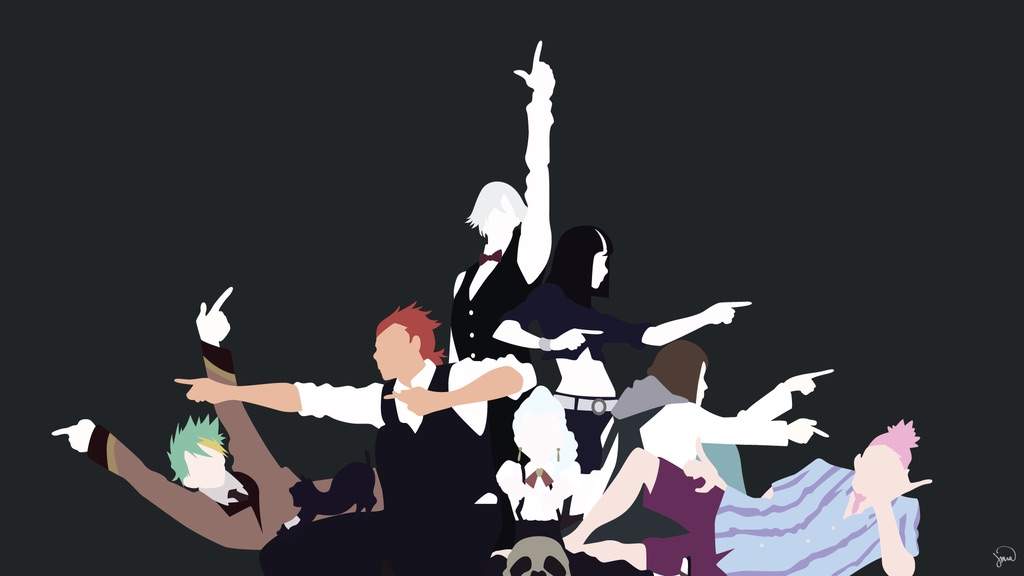
Let’s not waste time here. One of the absolute biggest highlights of Death Parade is its fantastic opening. It’s so good, that I put it on my Top 25 Anime Openings list only a few months after hearing it. Let’s just get to listening to it, and we can circle back afterwards:
Man, what a ride.
While the opening, “Flyers” by Bradio, is a dramatic tonal departure from the actual show, its quality is undeniable. However, for such a bleak, show, a contrasting opening might be exactly what we need as an audience to keep our spirits up. The catchy, upbeat tempo eventually becomes a regularly welcomed breath of fresh air during an otherwise melancholy viewing experience.
Outside of the opening, the show’s OST is understatedly (a word now because I said so) brilliant. Certain tracks such as “Memento Mori” and “Regret of the Death” have a way of creeping under your skin and striking the most emotional nerves. Bonus points if you spot the melodic theme both songs follow.
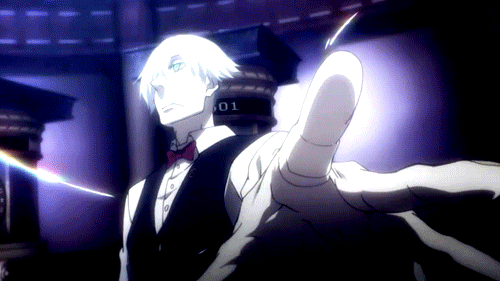
It’s done in a way that perfectly compliments the scene at hand, to the point that you’re no longer “hearing” the songs, but instead “feeling”. And this goes for the entire emotional spectrum that the soundtrack covers, too.
In the question of Dub vs. Sub, I’ll side with the Sub on this one. Now, this isn’t to say that the Dub is bad in any way. This is Funimation after all, who are heralded as the masters of Anime dubbing after producing a slew of excellent dubs like Dragon Ball Z, Baccano!, Fullmetcal Alchemist, and Fooly Cooly.

Decim’s personality is slightly altered in the Dub, as he’s presented as less of a judge of despair and more as a bartender just doing his job. Decim isn’t the issue, though. My real problem with the dub is Nona’s voice. The Dub makes her go from sounding like an authoritative figure in the Japanese version to a downright brat in English. While Nona isn’t in every episode of the show, she’s still in enough to the point that her bratty voice started to wear on me.
Death Note’s effectively ghost-like soundtrack perfectly complements the tone of each episode’s plot, and is only overlooked in favor of the show’s instant classic of an opening.
Animation

The visual quality of Death Parade is top notch, which is to be expected for a show that only needed to stretch its budget across 12 episodes.
While the animation isn’t anything necessarily groundbreaking, an aspect that’s surely worthy of praise is the virtuosic use of lighting.
Since the design of Quindecim is mostly comprised of muted colors, the appearance of any vibrant color is caused by timely lighting. Whether through stained glass, reflections, or the lamps of the bar itself, the show does an excellent job of providing a spectrum of colors without compromising the tone of the bar.
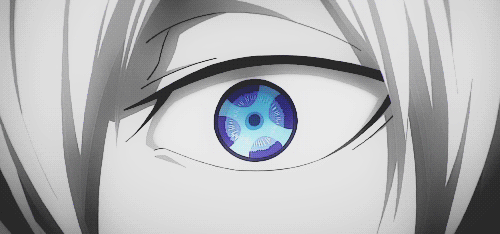
Another aspect that I found interesting was the design of the Arbiters’ eyes. Since most Arbiters in the tower operate with stoic facial expressions, their eyes are the main way the audience can tell what they’re thinking. This is particularly true in the case of Decim, who displays the least amount of outward emotion out of the main cast.
The vibrant colors of their eyes ties into the overall style of the show, as another example of vibrant colors peeking through a dismal setting.
Themes

While certain events of the show might be forgotten amidst the various characters and stories, the themes of Death Parade are sure to have a lasting impact.
The series deals with many heavy, uncomfortable topics.
I’ll start with one that might be overlooked, which is the effect of death on the living. Not only do we get to see the contestants reflect on their lives and subsequent deaths, but we also get quick glimpses on how their passing affected their loved ones. It helps expand the scope of the show, and reminds us that the impact of death extends well beyond the individual.
The series doesn’t dig into this theme as much as others, but it certainly gets the wheel turning in our heads.

The concept of the Arbiter process in general helps highlight the importance of living a fulfilled life– especially under the certainty that we will all someday die. Whether the fact that those who lived good lives are sent to reincarnation under the assumption that they’ll do so in the next life is never directly stated, but it would explain why Decim constantly states how much he values those who die without regret.
Which leads me to the next theme: postmortem regret. I found that scenes depicting the contestants expressing their life regrets (in agonizing fashion) to be the hardest to watch, to the point that I had to look away from the screen altogether. I suspect it’s because these moments hit so close to home.
We all have regrets in our lives, and I can only imagine how numbingly (a word because I say so) hopeless one might feel when the window to rectify them has closed. We get to see the despair one feels in this scenario–and it’s every bit as poignant as we feared.
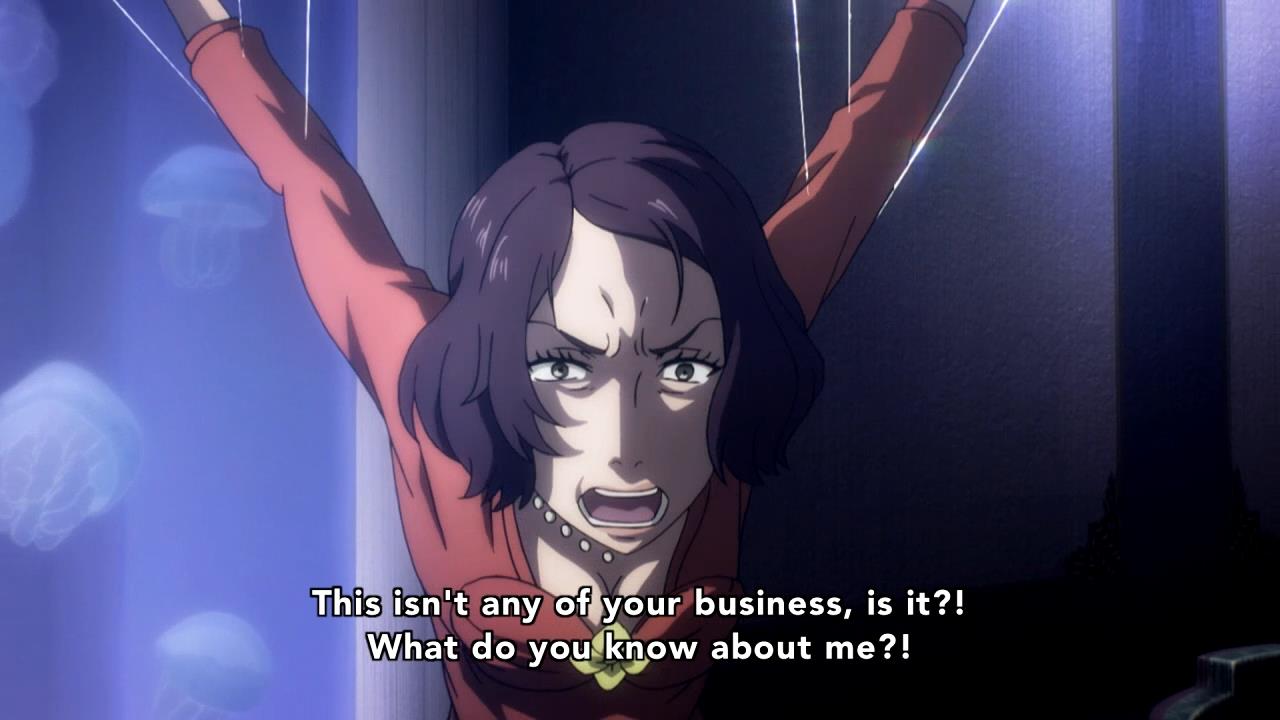
However, while the Arbiters initially come off as these perfectly objective beings of judgment, we learn progressively learn that they too can make mistakes. This brings up a lot of questions about the fairness of divine judgement. There is much more to someone than the way they died, and deciding someone’s fate based solely on the darkest corners of their soul might be an oversimplification of life.
The Black-haired Woman’s presentation of this flaw is her biggest utility to the story. Her outside perspective again mirrors that of our own, and we really start questioning how fair the Arbiters really are.
Ending
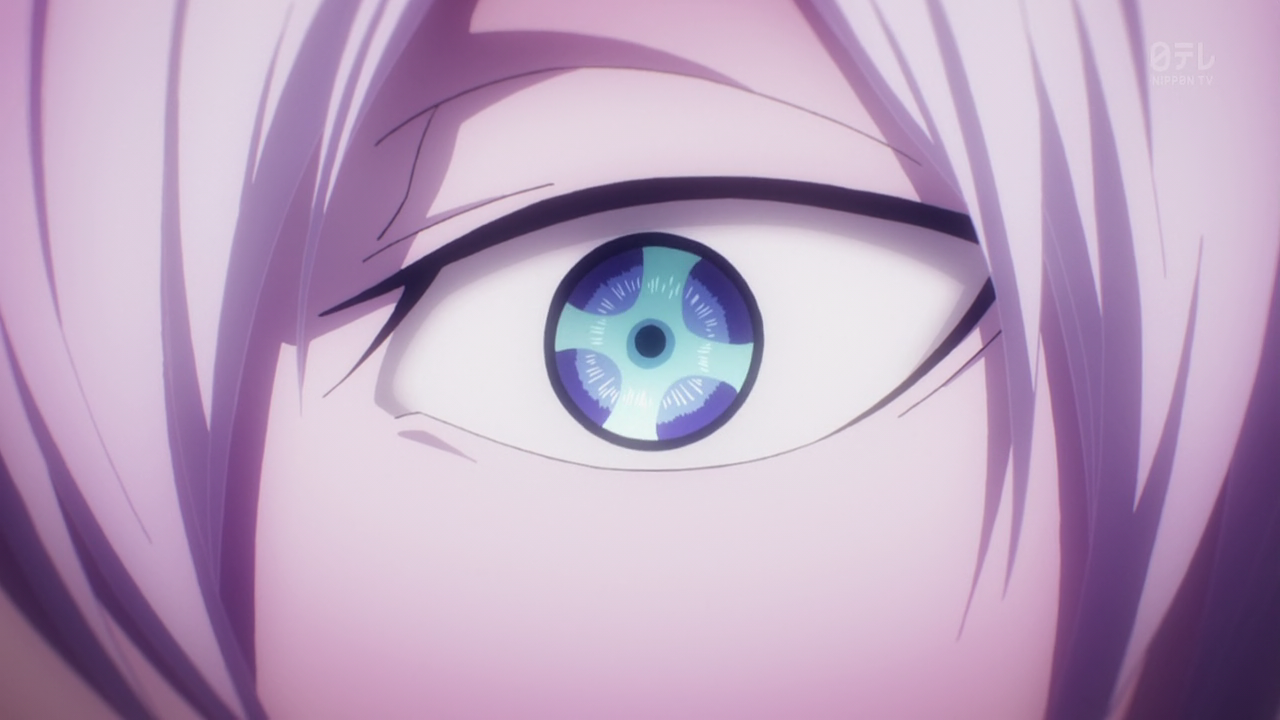
Oh boy.
Up to this point, I’m sure it seems as though I find this series infallible. However, the last few episodes is where Death Parade really hits a roadblock (pun definitely intended).
While I love shows that can tell a cohesive story in relatively few episodes (FLCL, Baccano!, Paranoia Agent), Death Parade just leaves a bit too much on the table to have a satisfying ending. Going too much into detail would be wading in spoiler territory.
With that in mind, I’ll say this: a lot of things that the plot sets up during the show are completely swept under the rug down the stretch. This sets up an experience I like to call “Anime Blue Balls”. Another, infinitely more extreme example would be the original ending to Neon Genesis: Evangelion.
(…And if you haven’t seen Evangelion–please do so. Most Anime elitists (like me) won’t even consider you a true fan of the medium if you haven’t seen that show. So, yeah.)
I think the anticlimactic ending of Death Parade is what really prevents it from being a “Great” show. That being said, it is still very good.
Personal Enjoyment
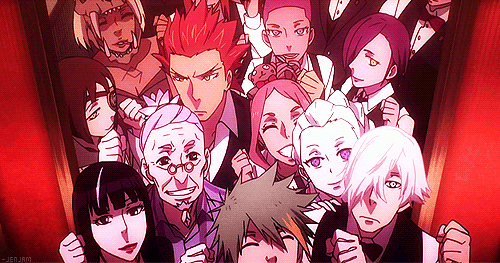
Death Parade is not a show that I think every Anime fan needs to watch: Death Parade is a show I think everyone needs to watch, Anime fan or not.
While the ending absolutely takes away from its overall experience, its thought-provoking themes, attention-sucking plots, and short length add up to a show that I can only recommend highly.
Verdict
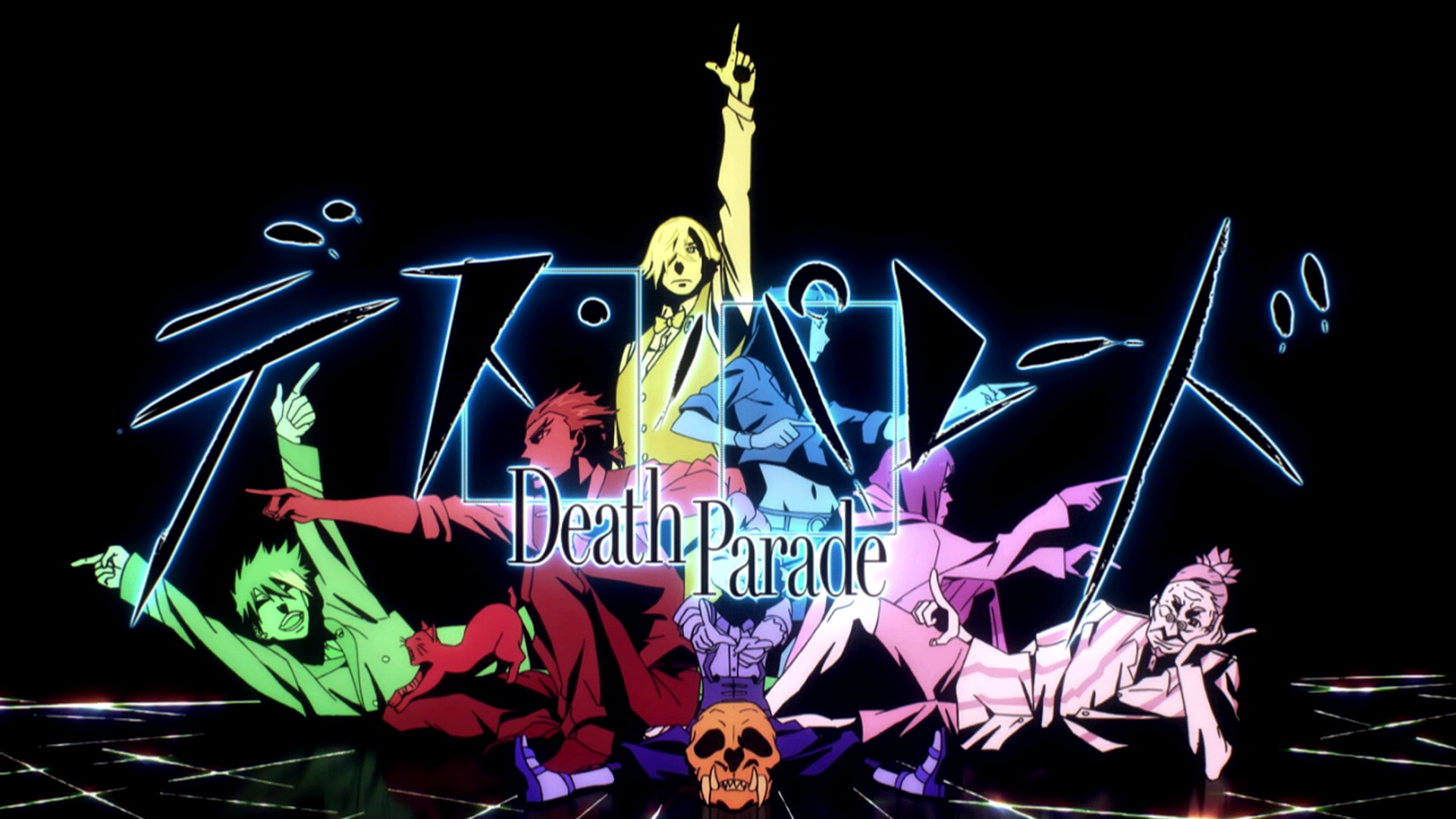
Does Death Parade necessarily match the quality of a provocative classic like Paranoia Agent? No.
However, it does provide a unique enough experience to compensate for its pedestrian ending. It’s really more of a “journey, not the destination” kind of show.
I can honestly say that this show has changed my life for the better, and I have high confidence that it will do the same for many of you.
Pros
- Plots that grab your attention and refuse to let go
- Endearing characters
- Sublime themes
- Strategic use of color
- THAT. FUCKING. OPENING.
Cons
- Maybe a bit too short
- A woefully disappointing ending
- Too much focus on the Black-Haired Woman
Verdict: 8.5/10
Recommended Series:
- Paranoia Agent
- Neon Genesis: Evangelion (+ The End of Evangelion)
- Mushishi
- Bartender
And one more time, just for good time’s sake: